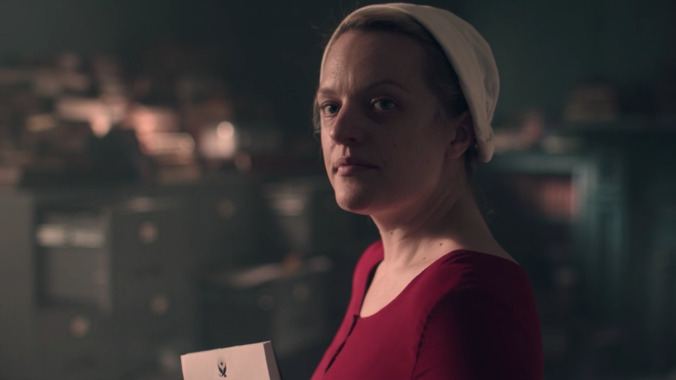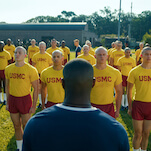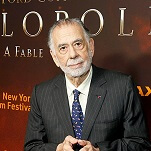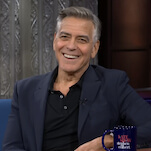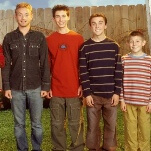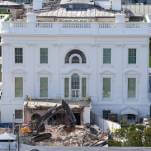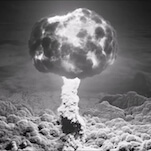Elisabeth Moss Screenshot:
Take medication away from a person who needs it, and things happen. Subject someone to years of violence, control, oppression, cruelty, and mental and physical torture, and things happen. Take a child from its mother. Give information to someone you don’t trust. And oh, commit war crimes. Do those things, and other things happen. Chaos, eventually, intrudes.
“Liars” is credited to Yahlin Chang, who also scripted one of last season’s highlights. There are ways in which this episode could have been a highlight, too. The problem is that Chang’s script only works if you’ve accepted that a state like Gilead is inherently full of risk and chaos for the oppressed and, every so often, for the oppressors. You have to believe that, and the show itself hasn’t believed it this season. June’s survival doesn’t feel like a series of narrow misses, or as though it’s the result of her own toughness or endurance. It feels like she’s survived because the show has needed her to, traveling through this horrifying world with plot armor that’s all the more obvious because she constantly does things that would definitely get her killed.
So what “Liars” should be is an episode where the bill comes due, where after three seasons of picking up grenades and juggling them, one finally goes off. But when June and Lawrence pull up outside Jezebel’s, we have no reason to believe she’s at risk. If June felt that false sense of security, that would make sense—and she does. But for the audience, the sense of security is not false. Lawrence calls June an “ice queen,” a line that tries to do a lot of heavy-lifting, convincing us that the woman who just a few episodes ago lost her shit on her walking partner in the middle of the street and who, the episode after that, attacked a Wife with a scalpel she stole, is always cool, calm, and collected. (It’s possible Lawrence doesn’t know about the latter but there’s no way he doesn’t know about the former.) We have to believe she’s an ice queen, because we’re supposed to be surprised when she snaps.
Frankly, I don’t know how much more there is to say about The Handmaid’s Tale and rape, at least in a recap like this one. It’s a given circumstance of the show, both a key part of and a justification for Gilead’s existence as a state. To ignore it would be dishonest, to depict it so frequently is, at best, exhausting at the very best. So what is there to say about this latest act of horrifying sexual violence? How to write about a scene that—and forgive the intrusion of the personal, but it’s unavoidable here—is both nightmarish and something to which I’m almost numb?
All I can say with confidence is that it’s ineffective, and try to understand why. Why bring Chris Meloni on for a handful of scenes? Why not write a more substantial role for an actor of that caliber? If his window of availability was brief, that’s still no excuse for not fleshing out that character. Why not build to that big breaking point? June has been subjected to horrors for three seasons, and we’ve seen her near the breaking point many times before. Is the point that this one is different, or is it simply the straw that broke the camel’s back? What happened in her mind in the moments after? Does her inner voice go silent? Is it excluded from a record she’s making? Is she in shock? Is she at a loss? The what is perfectly clear—she’s caught in a dangerous position, but has submitted one to many times, and can’t “treat it like a job,” as she advised Lawrence last week, anymore. It’s everything else that’s murky, and if the rest of the season had more clarity, that might not be the case.
It’s the same problem the show has had since the end of its first season. It’s June’s show, and so June has to stay in Gilead. “Maternal love” and “mental health” are the two big regrets Lawrence lists, half sardonically, implying that Gilead doesn’t stand a chance. The show has told us that maternal love is what’s keeping her here, and that’s something one can accept and understand, even if the show has bungled the execution. But June doesn’t just have to stay in Gilead. She has to stay alive in Gilead, and that, the show has a much harder time justifying.
Lawrence hands June a gun and tells her they’re coming, as a handful of Marthas clean up the mess she made. The same is probably true, metaphorically, of the Martha network, who will be forced to scramble since June’s broken her word and definitely stuck her nose into their plans. But she won’t die. She can’t. Why should she move with stealth or care now, when she so rarely has? How is this killing, this act made at a breaking point, so different? It’s supposed to be, you can tell. But it’s just not true. June has acted with little regard for consequences all season, and just a few episodes ago she was supposed to have learned a big lesson about that. Where’d that go? This one should be different. But the only difference is scale and severity. June shouted at Serena just around the corner from a bunch of guards, handmaids, commanders, and cameras—one of the most mundane things she’s done that could have gotten her killed. The Handmaid’s Tale has given us no reason to fear that this time should be different.
That said, the bill has finally come due for Fred and (probably) Serena. We get another “can they reconnect?” story, a thread that’s never been all that compelling, despite the best efforts of the actors. But then Serena’s selfish, cruel pursuit of Nichole lands them both in Canada, and Fred gets arrested for war crimes. That has plenty of potential—especially if it’s leading to an exit—and the filmmaking is lovely, but boy, am I tired of that dynamic.
Not to act as a broken record, but what’s most frustrating and unclear is how clear-eyed The Handmaid’s Tale is about these flaws. Does the show know that June said she wouldn’t get in the way before immediately getting in the way? Does it know that she didn’t so much “save” the Martha who helps her as pull her from the pack because she could be useful? I have no idea. I hope so. There’s plenty here that could be interesting, but it just doesn’t get there, and time that could be spent exploring those contradictions (assuming the show is aware) is instead spent on Fred’s cool shades. It’s a misstep, and it didn’t have to be. What a shame.
But hey, once again, the acting’s great and it all looks good. There’s that, at least.
Stray observations
- Driving and listening to Chubby Checker does sound like fun.
- About those wide open spaces: So we’re meant to believe that Gilead tore all those “rusted factories” down, but left abandoned and often blood-covered buildings standing in Boston?
- Where were they, anyway?
- Fred didn’t know they were crossing the border? How did they get where they were? Map? GPS?
- Next week, at long last, MOIRA.
